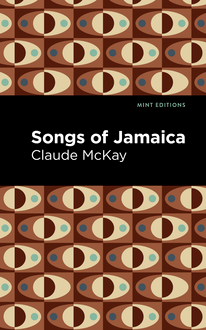-
 Univers
Univers
-
 Ebooks
Ebooks
-
 Livres audio
Livres audio
-
 Presse
Presse
-
 Podcasts
Podcasts
-
 BD
BD
-
 Documents
Documents
-
- Cours
- Révisions
- Ressources pédagogiques
- Sciences de l’éducation
- Manuels scolaires
- Langues
- Travaux de classe
- Annales de BEP
- Etudes supérieures
- Maternelle et primaire
- Fiches de lecture
- Orientation scolaire
- Méthodologie
- Corrigés de devoir
- Annales d’examens et concours
- Annales du bac
- Annales du brevet
- Rapports de stage
La lecture à portée de main
Vous pourrez modifier la taille du texte de cet ouvrage
Découvre YouScribe en t'inscrivant gratuitement
Je m'inscrisDécouvre YouScribe en t'inscrivant gratuitement
Je m'inscrisEn savoir plus
Vous pourrez modifier la taille du texte de cet ouvrage
En savoir plus

Description
Jamaica Anansi Stories is a collection of folklore by Martha Warren Beckwith. Having studied under famed ethnographer Franz Boas at Columbia University, Beckwith dedicated her career to recording and contextualizing the traditions of people from around the world. Specializing in Jamaican, Hawaiian, Sioux, and Mandan-Hidatsa cultures, Beckwith published widely acclaimed works of folklore and ethnography through her interviews with native storytellers around the world. “One great hungry time. Anansi couldn't get anyt'ing to eat, so he take up his hand-basket an' a big pot an' went down to the sea-side to catch fish. When he reach there, he make up a large fire and put the pot on the fire, an' say, ‘Come, big fish!’” Opening her collection with the lighthearted and instructional “Animal Stories,” many of which record the conflicts between Anansi and the Tiger, Beckwith introduces her reader to one of central figures of Jamaican folklore. Associated with resistance, play, and resourcefulness, Anansi was a symbol of hope for a people subjected to centuries of slavery. Situated alongside similar tales from Europe, popular songs, riddles, and jokes, the Anansi stories form an invaluable part of Jamaican culture and of other Caribbean and American cultures who trace their origins to West Africa. With a beautifully designed cover and professionally typeset manuscript, this edition of Martha Warren Beckwith’s Jamaica Anansi Stories is a classic of anthropological literature reimagined for modern readers.
Sujets
Informations
| Publié par | Mint Editions |
| Date de parution | 28 mai 2021 |
| Nombre de lectures | 0 |
| EAN13 | 9781513293592 |
| Langue | English |
| Poids de l'ouvrage | 4 Mo |
Informations légales : prix de location à la page 0,0500€. Cette information est donnée uniquement à titre indicatif conformément à la législation en vigueur.
Extrait
Jamaica Anansi Stories
Martha Warren Beckwith
Jamaica Anansi Stories was first published in 1924.
This edition published by Mint Editions 2021.
ISBN 9781513290744 | E-ISBN 9781513293592
Published by Mint Editions®
minteditionbooks .com
Publishing Director: Jennifer Newens
Design & Production: Rachel Lopez Metzger
Project Manager: Micaela Clark
Typesetting: Westchester Publishing Services
C ONTENTS P REFACE A NIMAL S TORIES O LD S TORIES , CHIEFLY OF S ORCERY M ODERN E UROPEAN S TORIES D ANCE AND S ONG W ITTICISMS R IDDLES N OTES
P REFACE
The stories in this collection were taken down from the lips of over sixty negro story-tellers in the remote country districts of Jamaica during two visits to the island, one of six weeks in the summer of 1919, the other of five weeks in the winter of 1921. The music was all recorded during the second visit by Miss Helen Roberts, either directly from the story-teller or from a phonographic record which I had made. In this way the original style of the story-telling, which in some instances mingles story, song and dance, is as nearly as possible preserved, although much is necessarily lost in the slow process of dictation. The lively and dramatic action, the change in voice, even the rapid and elliptical vernacular, can not appear on the printed page. But the stories are set down without polish or adornment, as nearly as possible as they were told to me, and hence represent, so far as they go, a true folk art.
Although some story-tellers claimed to know “more than a hundred” stories, no one narrator gave me more than thirty, and usually not more than four or five at one interview.
To all such story-telling, as to riddling and song, the name of “Anansi story” is applied,—an appellation at least as old as 1816, when Monk Lewis in his journal describes the classes of “Nancy stories” popular in his day among the negroes as the tragical witch story and the farcical “neger-trick.” The “neger-trick” harks back to slave times and is rarely heard today; tales of sorcery, too, are heard best from the lips of older narrators. Modern European fairy tales and animal stories (evidently unknown to Lewis) have taken their place. Two influences have dominated story-telling in Jamaica, the first an absorbing interest in the magical effect of song which, at least in the old witch tales, far surpasses that in the action of the story; the second, the conception of the spider Anansi as the trickster hero among a group of animal figures. Anansi is the culture hero of the Gold Coast,—a kind of god—, just as Turtle is of the Slave coast and Hare (our own Brer Rabbit) of the Bantu people “Anansi stories” regularly form the entertainment during wake-nights, and it is difficult not to believe that the vividness with which these animal actors take part in the story springs from the idea that they really represent the dead in the underworld whose spirits have the power, according to the native belief, of taking animal form. The head-man on a Westmoreland cattle-pen even assured me that Anansi, once a man, was now leader of the dead in this land of shades. However this may be, the development of Jamaican obeah or witchcraft has been along the same two lines of interest. Magic songs are used in communicating with the dead, and the obeah-man who sets a ghost upon an enemy often sends it in the form of some animal; hence there are animals which must be carefully handled lest they be something other than they appear.
Riddling is a favorite pastime of the Jamaica negro. Much is preserved from old African originals in the personification of common objects of yard and road-side, much is borrowed also from old English folk riddling. That this spread has been along the line of a common language is proved by the fact that only a dozen parallels occur in Mason’s Spanish collection from Porto Rico, at least ten of which are quoted by Espinosa from New Mexico, while of collections from English-speaking neighbors, fourteen out of fifty-five riddles collected in South Carolina and nine out of twenty-one from Andros Island are found also in Jamaica. Particular patterns are set for Jamaica riddling into which the phrasing falls with a rhythmical swing careless of rhyme,—“My father has in his yard” and “Going up to town.” The giving of a riddle is regularly preceded by a formula drawn from old English sources—
Riddle me this, riddle me that,
Perhaps you can guess this riddle
And perhaps not!
generally abbreviated into
Riddle me riddle,
Guess me this riddle,
And perhaps not.
The art is practised as a social amusement, groups forming in which each person in the circle must propound riddles until his supply is exhausted or his riddle unguessed.
My own work as a collector in this engrossing field of Jamaican folk-lore owes much to those collectors who have preceded me and who have enjoyed a longer and more intimate acquaintance than has been possible for me with the people and their idiom;—to Monk Lewis, a true folk-lorist, whose “Journal” of 1816 is of the greatest interest today, to Mr. Walter Jekyll and his excellent volume of songs and stories in the Folk-lore Publications of 1907, and to the writers of nursery tales, Mrs. Milne-Home, Pamela Smith, and Mrs. W. E. Wilson (Wona). I take this opportunity also to acknowledge most gratefully the many courtesies for which I am indebted during my visits to the island. I particularly wish to thank Professor Frank Cundall for his advice and cooperation, and for the use of the invaluable West India library connected with the Jamaica Institute in Kingston where I was able to consult books not easily to be found in library collections. To the Hon. and Mrs. Coke-Kerr, to Mrs. Harry Farquharson and to the Rev. and Mrs. Ashton I am gratefully indebted for many courtesies in the task of finding reliable native informants. To these informants themselves,—to Simeon Falconer, William Forbes, George Parkes, and a score of others I owe thanks for their ready response to my interest. In America also I wish to thank Mrs. Elsie Clews Parsons for suggestions as to method and for the use of her valuable bibliography and Mrs. Louise Dennis Hand for help with Spanish collections, and to express my grateful obligations to Professor Franz Boas for his patient editing and valuable bibliographical suggestions.
Martha Warren Beckwith
The Folk-lore Foundation
Vassar College
April, 1924
A NIMAL S TORIES
1. Tying Tiger
a. The Fish-basket
George Parkes, Mandeville
O NE GREAT HUNGRY TIME. A NANSI couldn’t get anyt’ing to eat, so he take up his hand-basket an’ a big pot an’ went down to the sea-side to catch fish. When he reach there, he make up a large fire and put the pot on the fire, an’ say, “Come, big fish!” He catch some big fish put them aside. He said, “Big fish go, make little fish come!” He then catch the little fish. He say, “Little fish go, make big fish come!” an’ say, “Big fish go, make little fish come!” He then catch the pot full an’ his hand-basket. He bile the pot full and sit down and eat it off; he then started home back with the pot on his head and the basket. Reaching a little way, he hide the pot away in the bush an take the basket along with him now.
While going along, he meet up Tiger. Now Tiger is a very rough man an’ Anansi ’fraid of him. Tiger said to him, “What you have in that basket, sah?”—speak to him very rough. Anansi speak in a very feeble voice, say, “Nothing, sah! nothing, sah!” So both of them pass each other, an’ when they went on a little way, Tiger hide in the bush watching Anansi. Anansi then sit down underneath a tree, open his basket, take out the fishes one one, and say, “Pretty little yallah-tail this!” an’ put it aside; he take out a snapper an’ say, “Pretty little snapper this!” an’ put it one side; he take out a jack-fish an’ say, “Pretty little jack-fish!” an’ put it one side. Tiger then run up an’ say, “Think you havn’t not’ing in that basket, sah!” Anansi say, “I jus’ going down to the sea have a bathe, sah, an’ I catch them few ’itte fishes.” Tiger say, “Give it to me here, sah!”—talk in a very rough manner. An’ Tiger take it an’ eat them all an’ spit up the bones. Anansi then take up the bones an’ eat them, an’ while eating he grumble an’ say, “But look me bwoy labor do!” Tiger say, “What you say?” Anansi say, “Fly humbug me face, sah!” (brushing his face).
So both of them start to go home now with the empty basket, but this time Anansi was studying for Tiger. When he reach part of the way, Anansi see a fruit-tree. Anansi say, “What a pretty fruit-tree!” (looking up in the tree). Tiger say, “Climb it, sah!” (in a rough manner). So when Anansi go up an’ pull some of the fruit, at that time Tiger was standing underneath the tree. Anansi look down on Tiger head an’ said, “Look lice in a Brar Tiger head!” Tiger said, “Come down an’ ketch it, sah!” Anansi come down an’ said to Tiger he kyan’t ketch it without he lean on the tree. Tiger said, “Lean on the tree, sah!” The hair on Tiger head is very long. So while Anansi ketchin’ the lice, Tiger fell asleep. Anansi now take the hair an’ lash it round the tree tie up Tiger on the tree. After he done that he wake up Tiger an’ say that he kyan’t ketch any more. Tiger in a rough manner say, “Come an’ ketch it, sah!” Anansi say, “I won’t!” So Anansi run off, Tiger spring after him, an’ fin’ out that his hair is tied on the tree. So Tiger say, “Come an’ loose me, sah!” Anansi say. “I won’t!” an’ Anansi sing now,
“See how Anansi tie Tiger,
See how Anansi tie Tiger,
Tie him like a hog, Tiger,
See how Anansi tie Tiger,
Tie him like a hog, Tiger!”
An’ Anansi leave him go home, an’ a hunter-man come an’ see Tiger tie on the tree, make kill him.
b. The Storm
Vivian Bailey, Mandeville
B RER T IGER GOT A MANGO-TREE in his place. Brer Nansi go an’ ask if he could sell him a ha’ penny wort’ of mango. Brer Tiger say no. Brer Nansi well want de mango. B
-
 Univers
Univers
-
 Ebooks
Ebooks
-
 Livres audio
Livres audio
-
 Presse
Presse
-
 Podcasts
Podcasts
-
 BD
BD
-
 Documents
Documents
-
Jeunesse
-
Littérature
-
Ressources professionnelles
-
Santé et bien-être
-
Savoirs
-
Education
-
Loisirs et hobbies
-
Art, musique et cinéma
-
Actualité et débat de société
-
Jeunesse
-
Littérature
-
Ressources professionnelles
-
Santé et bien-être
-
Savoirs
-
Education
-
Loisirs et hobbies
-
Art, musique et cinéma
-
Actualité et débat de société
-
Actualités
-
Lifestyle
-
Presse jeunesse
-
Presse professionnelle
-
Pratique
-
Presse sportive
-
Presse internationale
-
Culture & Médias
-
Action et Aventures
-
Science-fiction et Fantasy
-
Société
-
Jeunesse
-
Littérature
-
Ressources professionnelles
-
Santé et bien-être
-
Savoirs
-
Education
-
Loisirs et hobbies
-
Art, musique et cinéma
-
Actualité et débat de société
- Cours
- Révisions
- Ressources pédagogiques
- Sciences de l’éducation
- Manuels scolaires
- Langues
- Travaux de classe
- Annales de BEP
- Etudes supérieures
- Maternelle et primaire
- Fiches de lecture
- Orientation scolaire
- Méthodologie
- Corrigés de devoir
- Annales d’examens et concours
- Annales du bac
- Annales du brevet
- Rapports de stage















